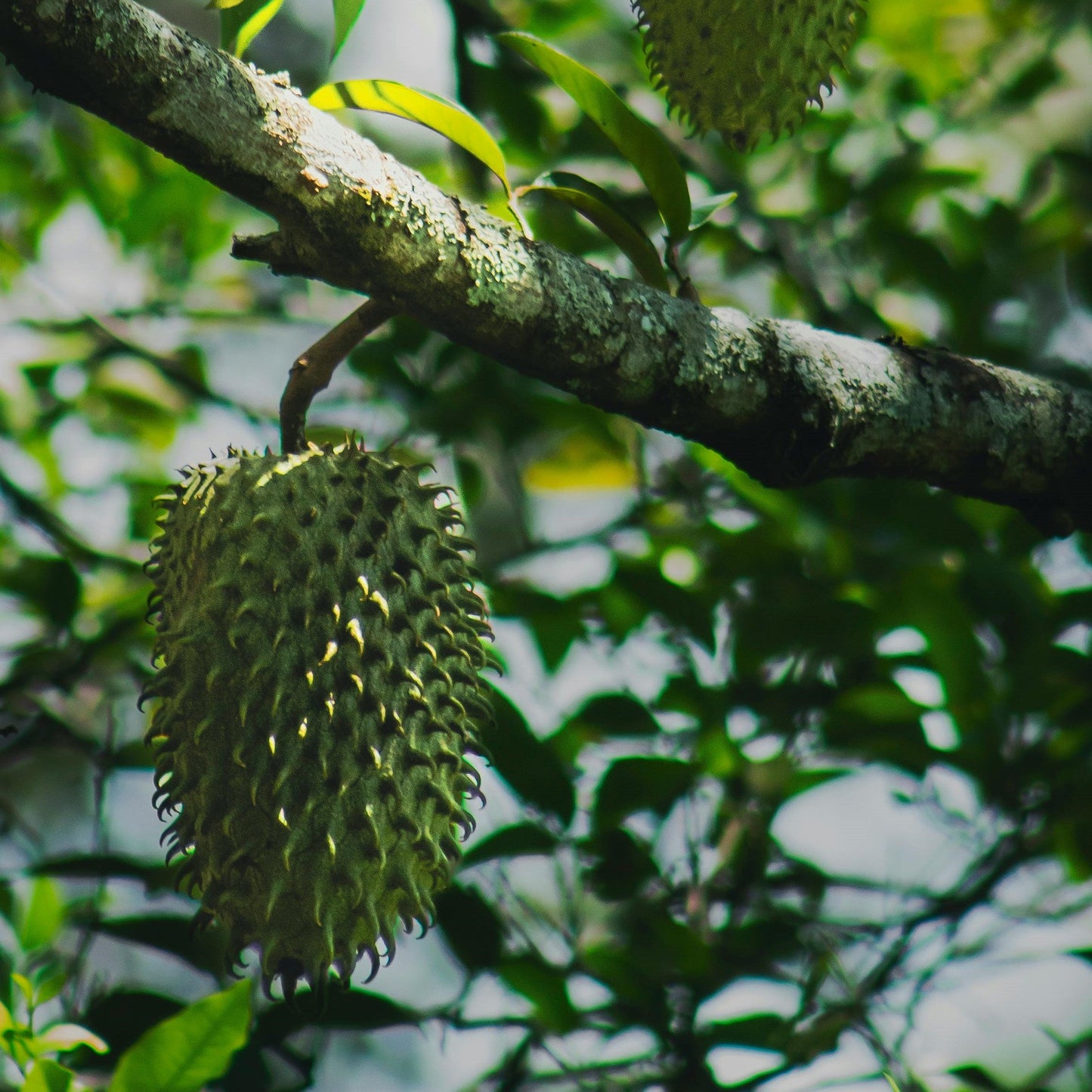Buy your weekday smoothies and get your weekend ones for free. (7 for the price of 5!)

Soursop leaves come from the soursop tree (Annona muricata), a tropical plant well-loved for its spiky green fruit. But beyond the fruit, its leaves have been used in traditional medicine for centuries — brewed into teas, applied topically, or infused into herbal tonics. These soursop leaves are a natural pharmacy in disguise, offering a mix of nutrients and plant compounds that can benefit your body in surprising ways.
Nutritional Profile of Soursop Leaves
Vitamins and Minerals
Soursop leaves are loaded with essential nutrients like vitamin C, vitamin A, calcium, magnesium, and iron. These work together to support immune health, bone strength, and overall vitality.
Antioxidant Compounds
They contain powerful antioxidants such as acetogenins, tannins, and alkaloids that help fight free radicals — those pesky molecules that speed up aging and cause cell damage.
Health Benefits of Soursop Leaves
Boosting Immune Health
Thanks to its vitamin C content and antioxidants, soursop leaf tea can help your body ward off colds, flu, and other infections.
Supporting Digestive Wellness
Traditionally, soursop leaves have been used to ease constipation, bloating, and indigestion. They have natural anti-inflammatory properties that calm the stomach lining.
Managing Blood Sugar Levels
Some studies suggest that soursop leaves may help regulate blood sugar, making them potentially beneficial for people with type 2 diabetes.
Enhancing Sleep Quality
Having trouble sleeping? Soursop leaf tea is known for its calming effects, helping you relax and fall asleep faster.
Reducing Inflammation
Inflammation is linked to many chronic diseases. The compounds in soursop leaves can help reduce pain and swelling, especially in conditions like arthritis.
Supporting Heart Health
By reducing bad cholesterol levels and improving circulation, soursop leaves may help keep your heart healthy.
Traditional and Cultural Uses
Herbal Medicine Practices
In Caribbean, African, and Southeast Asian cultures, soursop leaves are brewed into teas or used in baths to relieve fever and pain.
Folk Remedies Around the World
Some traditions use them for postpartum recovery, skin rashes, and wound healing.
How to Use Soursop Leaves
Soursop Leaf Tea
The most common method — steep fresh or dried leaves in hot water for 5–10 minutes for a mild, earthy tea.
Infused Oils and Extracts
Leaves can be soaked in coconut oil to create a topical rub for sore muscles.
Topical Applications
Crushed leaves are sometimes applied directly to skin to soothe insect bites or minor wounds.
Possible Side Effects and Precautions
Safe Dosage Guidelines
Moderation is key — too much can cause nausea or dizziness.
Who Should Avoid It
Pregnant women, breastfeeding mothers, and people with low blood pressure should consult a doctor before use.
Scientific Research on Soursop Leaves
Anticancer Potential
Some lab studies suggest soursop leaf extracts may target cancer cells, but more human research is needed.
Antimicrobial Properties
The leaves show promise in fighting bacteria, fungi, and parasites.
Where to Buy Soursop Leaves
Fresh vs. Dried Options
Fresh leaves have the strongest aroma, but dried leaves are more convenient for storage.
Online and Local Markets
Look for organic sources to avoid pesticide residue.
Storage Tips for Maximum Freshness
Store dried leaves in an airtight container away from sunlight. Fresh leaves should be refrigerated and used within a week.
Conclusion
Soursop leaves are more than just greenery from a tropical tree — they’re a versatile, nutrient-packed herbal remedy. From boosting immunity to aiding sleep, their benefits are rooted in both tradition and modern science. While they can be a healthy addition to your wellness routine, always use them wisely and seek professional advice for medical concerns.
FAQs
1. Can I drink soursop leaf tea every day?
Yes, but limit it to 1–2 cups daily for safety.
2. Does soursop leaf tea have caffeine?
No, it’s naturally caffeine-free.
3. Can soursop leaves help with weight loss?
Indirectly, yes — they may support digestion and metabolism.
4. Are soursop leaves safe for children?
In small amounts, yes, but consult a pediatrician first.
5. How do I know if my soursop leaves are fresh?
They should be deep green with a natural, slightly sweet aroma.